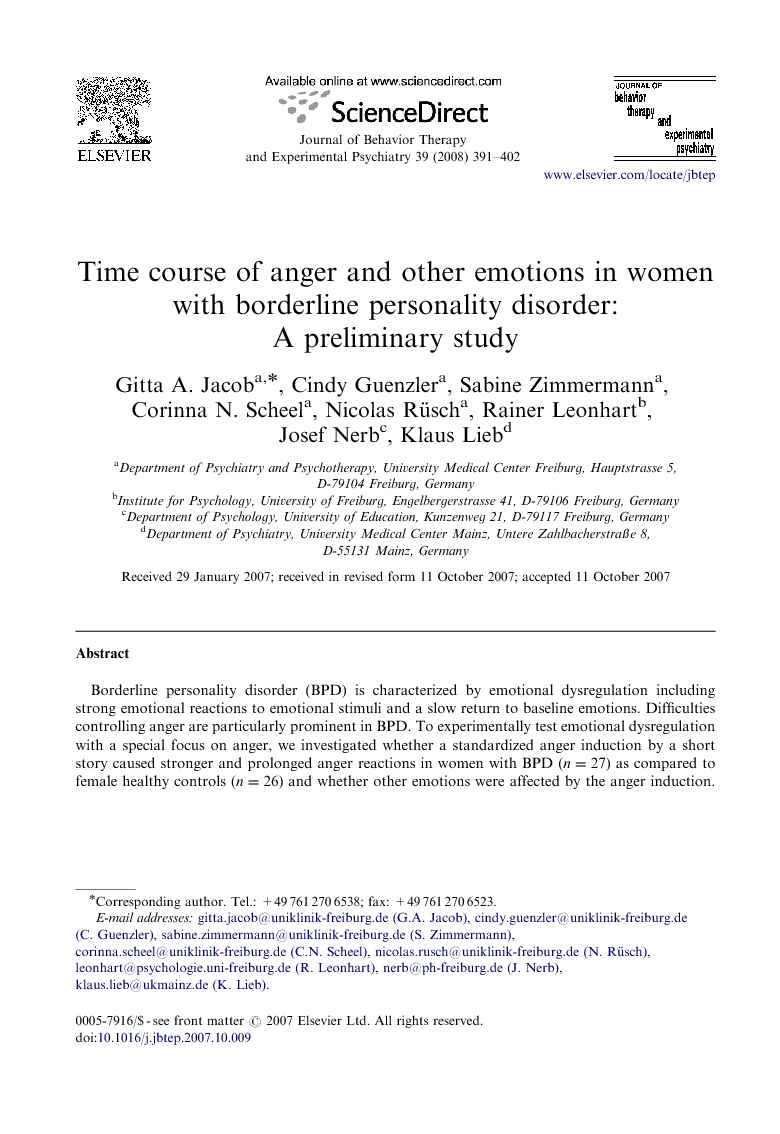Borderline personality disorder (BPD) is characterized by emotional dysregulation including strong emotional reactions to emotional stimuli and a slow return to baseline emotions. Difficulties controlling anger are particularly prominent in BPD. To experimentally test emotional dysregulation with a special focus on anger, we investigated whether a standardized anger induction by a short story caused stronger and prolonged anger reactions in women with BPD (n=27) as compared to female healthy controls (n=26) and whether other emotions were affected by the anger induction. Although the anger reaction was not stronger in the BPD group, it was significantly prolonged. The BPD group showed also stronger negative emotions over the whole experiment. The study is the first to demonstrate prolonged anger reactions in BPD patients in an experimental setting.
Emotional dysregulation is a core feature of borderline personality disorder (BPD) and one of the nine diagnostic criteria (criterion 6) according to DSM-IV (American Psychiatric Association, 2000). In the clinical impression and according to the biosocial theory of Linehan (1993), emotional dysregulation in BPD is characterized by different emotional phenomena: Emotions are easily triggered in BPD patients, rise quickly to an abnormally high level and last longer than in healthy individuals. While emotional dysregulation is related to negative emotions in general, anger and rage are seen as prominent emotions in BPD (criterion 8 in DSM-IV). Accordingly, BPD groups typically show high levels of trait anger (e.g. Gardner, Leibenluft, O’Leary, & Cowdry, 1991; Linehan, Tutek, Heard, & Armstrong, 1994).
Despite its high importance in BPD, emotional dysregulation has not been investigated very intensively so far (Arntz, 2005). There is some experimental evidence for emotional dysregulation in BPD, particularly in studies using self-reported assessments of emotions. For example, Herpertz, Gretzer, Muhlbauer, Steinmeyer, and Sass (1998) showed higher self-rated scores over a broad range of emotions in response to an emotional short story in BPD patients compared to patients with avoidant personality disorder. In a field study, Stiglmayr et al. (2005) showed stronger self-rated aversive tension in BPD subjects compared to healthy controls (HC). Levine, Marziali, and Hood (1997) found more intense responses to negative affects in BPD subjects than in non-BPD controls. Rüsch et al. (2007) found elevated state- and trait-shame in BPD subjects as compared to HC subjects and to women with social phobia. Koenigsberg et al. (2002) reported increased self-reported affective lability of anger, anxiety and oscillation between depression and anxiety in BPD subjects compared to other personality disordered patients, while self-rated affective intensity was not associated with BPD in this study.


